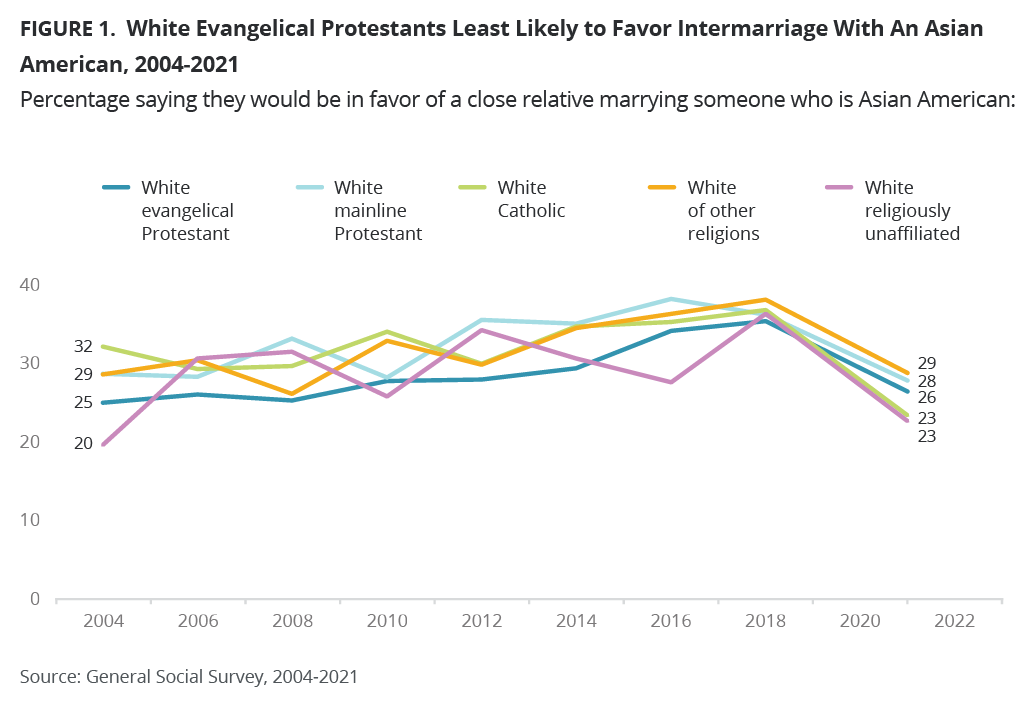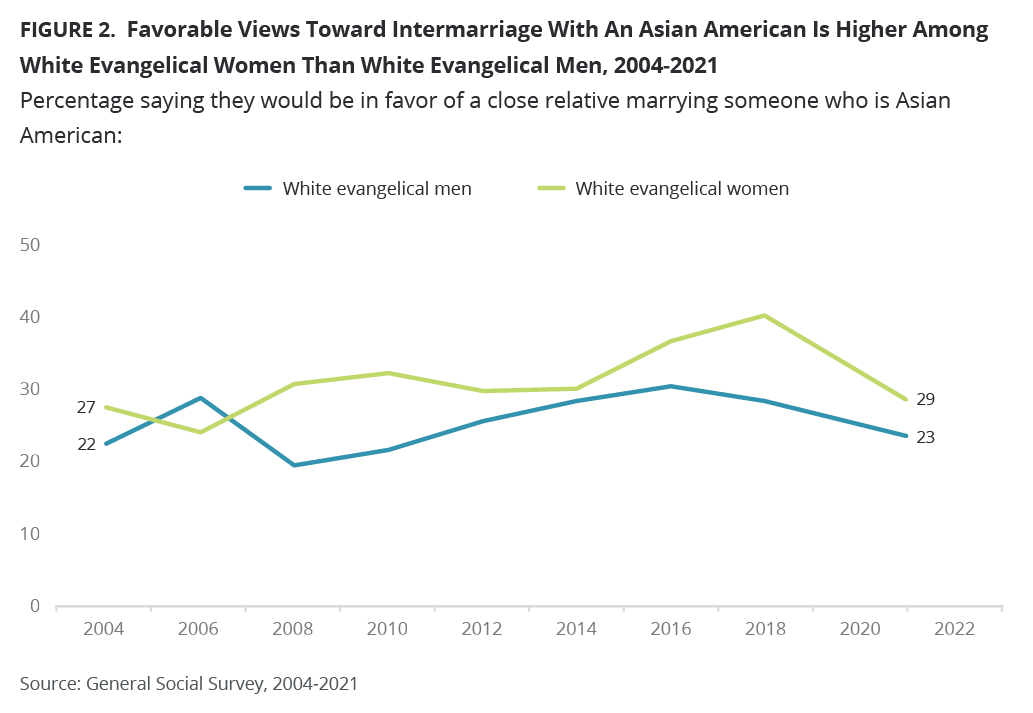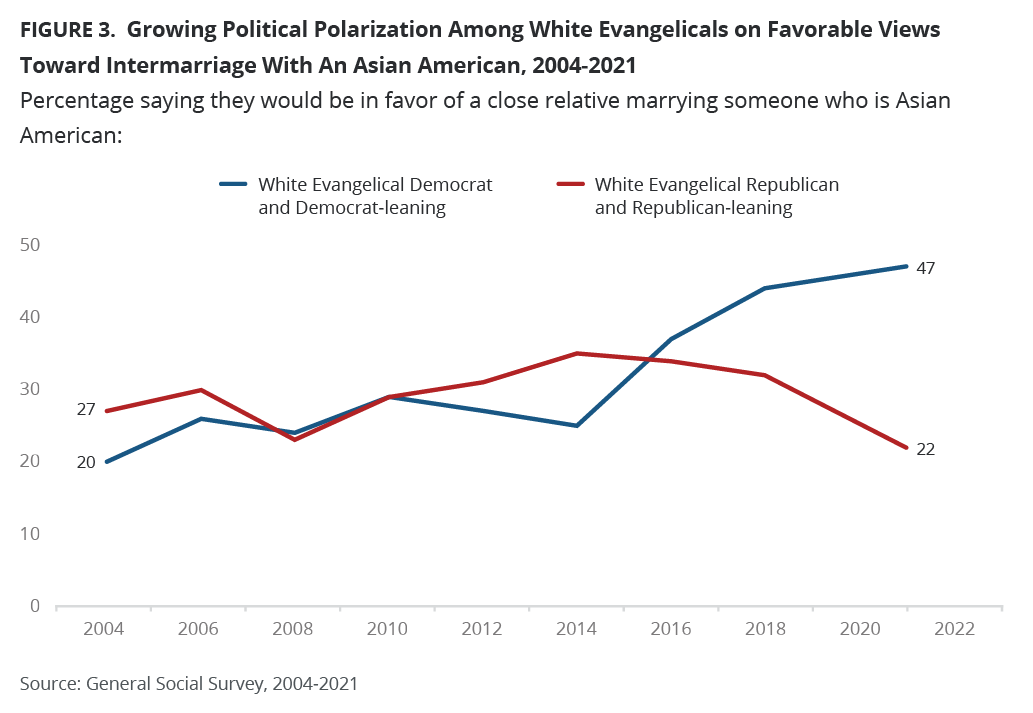Since the beginning of the COVID-19 pandemic, anti-Asian racism has been rising rapidly across the United States. In March 2021, six Asian women were murdered in a shooting rampage in Atlanta. In 2022, an Asian American woman was pushed onto subway tracks in New York City and killed by an incoming train. Nationwide, the PRRI 2020 American Values Survey suggests that 55% of Americans agree that Asian people face lots of discrimination. Among Asian Americans, this figure jumps to 92%.[1]
Besides blatant, public racial violence, racism may also exist subtly in intimate relationships. Data collected from dating websites, such as OkCupid, show that Asian Americans, particularly Asian American men, may face more discrimination than any other racial group when it comes to romantic relationships. Moreover, recent studies have shown that white evangelical Protestants are among the most fervent supporters of Christian Nationalism, which endorses white supremacy and rejects racial and religious diversity.
Compared with whites from other religious groups, are white evangelical Protestants less likely to support interracial marriage with Asian Americans? And have these views changed over the years, particularly since the COVID-19 pandemic? From 2004 to 2021, the General Social Survey (GSS) asked respondents whether they would favor or oppose (or neither favor nor oppose) a close relative marrying an Asian American person.[2] The survey brings interesting findings to light:
Key finding #1: In all survey years except for 2010, white evangelical Protestants’ views of a close relative marrying an Asian American were more unfavorable than those of whites from other religious groups. However, the percentage of white evangelical Protestants holding such views declined between 2004 and 2021. In 2004, 30% of white evangelical Protestants were against a close relative marrying an Asian American, compared with only 8% in 2021, which was the lowest percentage in more than a decade.[3]
By contrast, though the percentage of whites who would favor a close relative marrying an Asian American generally increased from 2004 to 2018, there was a sharp drop in 2021, most likely as a result of the COVID-19 pandemic. Furthermore, with a few exceptions, from 2006 until 2018, favorable views remained consistently lower among white evangelical Protestants than among whites from other religious groups.

Key finding #2: There are gender divides among white evangelical Protestants in their views on intermarriage. White evangelical women show a consistent upward trend in favorable views (and higher than white evangelical men) of a close relative marrying an Asian American up to 2018, when 40% were in favor—the highest point in nearly two decades. In 2021, this figure dropped to 29%, most likely as a result of the COVID-19 pandemic. By contrast, there is no clear pattern among white evangelical men. While there was an increase in favorable views among white evangelical men from 2008 to 2016, the data show a downward trend since.

Key finding #3: The data reveal growing political polarization on the issue of intermarriage among white evangelical Protestants. Favorable views of a close relative marrying an Asian American have declined steadily among white evangelical Protestants who identify as Republican or Republican-leaning.[1] The decline from 2018 to 2021 was greater than in previous years—from 32% down to 22%. In contrast, since 2014, white evangelical Protestants who identify as Democrat or Democrat-leaning showed a steady increase in favoring a close relative marrying an Asian American—from 25% in 2014 to 47% in 2021, despite the possible influence of the COVID-19 pandemic.

The COVID-19 pandemic may have overshadowed white evangelical Protestants’ attitudes toward interracial marriage with Asian Americans. Like whites from other religious groups, white evangelical Protestants experienced a sharp drop in the percentage of people favoring a close relative marrying an Asian American in 2021. In addition, white evangelical women experienced a decline in their favorable views in 2021, narrowing the gap with their male counterparts. Interestingly, however, favorable views among white evangelical Protestants who identify as Democrat or Democrat-leaning do not appear to be affected by the COVID-19 pandemic. Instead, over the past two decades, they have grown more likely to be in favor of a close relative marrying an Asian American. These results show that white evangelical Protestants’ attitudes toward marrying Asian Americans can be multi-faceted, dynamic, and subject to the influence of major historical events.
[1] “Strong Democrat,” “not very strong Democrat,” and “Independent, close to Democrat” were recoded into “Democrat and Democrat-leaning” and “Independent, close to Republican,” “not very strong Republican,” and “strong Republican” were recoded into “Republican and Republican-leaning.”
[1] The number of cases for Asian Americans was 64, which is less than the desired sample size of 100. Results should be interpreted with caution.
[2] The General Social Survey (GSS) produces nationally representative data collected by the NORC research institution. Responses to this question were recoded to count both “favor” and “strongly favor” as “favor” and both “oppose” and “strongly oppose” as “oppose.”
[3] Religious tradition was recoded as follows: white evangelical Protestants, white mainline Protestants, white Catholics, whites of other religions, and religiously unaffiliated whites.
Fanhao Nie is a members of the 2022-2023 cohort of PRRI Public Fellows.